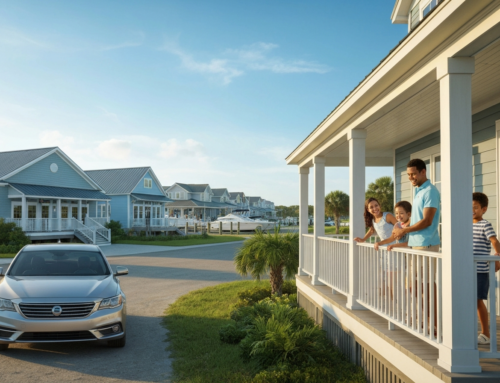Understanding Renters Liability Coverage for Tenants
For many renters in South Carolina and North Carolina, understanding the nuances of their insurance policies can be complex. While standard renters insurance protects personal belongings, a critical component often overlooked is Renters Liability Insurance. This specialized coverage is designed to shield tenants from significant financial repercussions if they are found legally responsible for bodily injury to another person or damage to someone else’s property, including the landlord’s. Unlike a landlord’s insurance policy, which covers the building’s structure, renters liability insurance specifically addresses a tenant’s potential negligence or accidental actions.
Essentially, renters liability insurance is a vital safety net. It operates independently from the personal property coverage that protects your belongings like furniture and electronics. The core purpose of liability coverage is to cover legal expenses and potential settlements or judgments arising from covered incidents for which you, as the tenant, are deemed responsible. This can prevent unforeseen accidents from leading to devastating financial burdens.
What Does Renters Liability Insurance Protect Against?
Renters liability insurance is designed to protect you in various scenarios where your actions, or those of individuals or pets living with you, inadvertently cause harm or damage to others. It’s a key part of your overall financial protection as a tenant. Without it, you could face substantial out-of-pocket costs for medical bills, property repairs, or legal fees.
The primary protections offered by renters liability insurance include:
- Bodily Injury: Covers medical expenses if a guest or visitor is injured in your rented home due to an accident for which you are responsible.
- Property Damage: Pays for damages you accidentally cause to someone else’s property. This can include a neighbor’s belongings or even the landlord’s property itself (e.g., if you cause a fire that damages the unit).
- Legal Fees: If you are sued as a result of a covered injury or property damage incident, this coverage can help pay for your legal defense costs, regardless of the lawsuit’s outcome.
It’s important to remember that this coverage extends beyond just your rental unit. For instance, if your dog, a covered pet under your policy, bites someone at a local park, the liability portion of your renters insurance may cover the medical expenses and legal costs. This broad protection makes it an indispensable part of responsible tenancy.
Key Scenarios Covered by Renters Liability Insurance
To illustrate the importance of renters liability insurance, consider these common real-world scenarios where this coverage would be invaluable:
- Guest Injury: A friend visits your apartment and slips on a wet floor, breaking an arm. They incur significant medical bills and decide to sue. Your renters liability insurance can cover their medical expenses and your legal defense costs.
- Accidental Fire: You accidentally leave a pot on the stove, leading to a kitchen fire that not only damages your unit but also spreads to a neighboring apartment, causing extensive damage to their property. This insurance can help cover the repair costs for both the landlord’s property and your neighbor’s belongings.
- Water Damage: An overflowing bathtub or a forgotten faucet causes water to leak into the unit below, damaging their ceiling and personal property. Renters liability insurance can cover these repair and replacement costs.
- Pet-Related Incidents: If you have a pet, and it bites a guest or causes damage to the rental property (beyond normal wear and tear), your liability coverage can step in to cover medical bills or repair costs. Many landlords require tenants with pets to have renters insurance specifically for this reason.
These examples highlight how unexpected incidents, even minor ones, can quickly escalate into substantial financial liabilities without proper coverage.
What Renters Liability Insurance Typically Excludes
While Renters Liability Insurance provides crucial protection, it’s equally important to understand its limitations. Not every incident or type of damage is covered. Common exclusions typically found in these policies include:
- Intentional Harm or Damage: If you intentionally cause injury to someone or damage property, your policy will not cover these costs. Insurance is designed for accidents and unforeseen events, not deliberate acts.
- Damage to Your Own Property: Renters liability insurance specifically covers damage to *other people’s* property or injuries to *other people*. Damage to your own personal belongings falls under the personal property coverage of your renters insurance policy, which may be subject to a deductible.
- Business-Related Claims: If you run a business out of your rented home, any liability arising from your business activities is typically not covered by a standard renters liability policy. You would need a separate business or commercial insurance policy for such risks.
- Certain Natural Disasters: While many perils like fire, theft, and wind are covered, most standard renters policies do not cover damage caused by floods or earthquakes. Tenants in areas prone to these events may need to purchase separate flood or earthquake insurance policies. For instance, the MoneyGeek guide to renters insurance explicitly states these exclusions.
- Vehicular Accidents: Damage or injuries resulting from car accidents are not covered by renters liability insurance; these fall under your auto insurance policy.
Reviewing your specific policy documents is always recommended to fully understand your coverage and any exclusions that may apply.
Why Renters Liability Insurance is Essential for SC & NC Tenants
For tenants residing in South Carolina and North Carolina, renters liability insurance isn’t just a recommendation—it’s often an essential safeguard. Both states, particularly coastal regions, are susceptible to various weather-related events, including hurricanes and tropical storms, which can lead to unforeseen incidents. While your personal property coverage handles your belongings, the liability aspect is crucial for the risks you pose to others or the property itself.
Many landlords in SC and NC now explicitly require tenants to carry renters insurance, with a specific minimum amount of liability coverage, as part of the lease agreement. This requirement protects the landlord’s investment from tenant-caused damage and minimizes the chance of disputes over who is responsible for repairs or injuries on the property. As highlighted by Azibo’s insights, tenant liability insurance specifically covers unintentional damage or harm tenants may cause to the rental property, giving landlords financial recourse for issues like water-related negligence.
Moreover, the potential costs of a liability claim can be staggering. A simple accident, such as a guest falling or a pipe bursting due to negligence, could result in medical bills, property repair costs, and legal fees totaling tens or even hundreds of thousands of dollars. Without adequate Renters Liability Insurance, tenants would be personally responsible for these expenses, potentially leading to financial ruin. This coverage offers crucial peace of mind, allowing you to enjoy your home without the constant worry of unexpected financial burdens from accidental mishaps.
How Much Renters Liability Coverage Do You Need?
Determining the appropriate amount of Renters Liability Insurance coverage is a critical step in safeguarding your financial future. While many policies offer a baseline of $100,000 in liability coverage, this may not be sufficient for everyone. The ideal coverage limit often depends on several factors, including your net worth, lifestyle, and potential risks associated with your living situation.
Consider the following when deciding on your liability limits:
- Your Assets: If you have significant savings, investments, or other valuable assets, a higher liability limit (e.g., $300,000 or even $500,000) can provide a greater shield against potential lawsuits. Legal judgments can sometimes target personal assets if your insurance coverage is insufficient.
- Lifestyle and Activities: Do you frequently host guests? Do you have pets, especially breeds often associated with higher liability risks? These factors can increase your exposure to potential claims. For instance, the CNBC Select guide notes that personal liability insurance for renters can extend to damage or injury caused by pets or other relatives in your household.
- Landlord Requirements: Many landlords specify a minimum liability coverage amount in their lease agreements. Always check your lease to ensure you meet this requirement.
Financial experts often recommend at least $100,000 in liability coverage as a starting point. However, for enhanced protection, opting for higher limits is generally advisable. An experienced insurance agent can help you assess your individual needs and recommend a liability limit that provides adequate security without unnecessary expense.
Finding Renters Liability Insurance in South Carolina and North Carolina
Securing comprehensive Renters Liability Insurance in South Carolina and North Carolina is a straightforward process, often included as a standard component of a broader renters insurance policy. The key is to compare options and ensure the coverage meets your specific needs and any landlord requirements.
Here’s how to approach finding the right policy:
- Understand the Basics: Most renters insurance policies in both states will include personal property coverage, additional living expenses, and personal liability coverage. Focus on the liability portion to ensure it meets your financial protection goals. The South Carolina Department of Insurance highlights that typical renters insurance includes coverage for personal possessions, liability protection, and additional living expenses, emphasizing that it doesn’t cover the building structure, which is the landlord’s responsibility (Understanding Renter’s Insurance).
- Compare Quotes from Multiple Providers: Prices can vary significantly between insurance companies based on factors like your location, the type of residence, and your claims history. For example, North Carolina’s average renters insurance cost is around $162 per year, but this can differ by city, with Wilmington being more expensive than Asheville (NerdWallet on NC Renters Insurance). Similarly, South Carolina has an average monthly cost of $21, with variations depending on coastal exposure (ValuePenguin on SC Renters Insurance).
- Consider Additional Coverages: Given the hurricane and tropical storm activity in both states, discuss with your insurer whether you need supplemental coverage for perils like flooding, which is typically excluded from standard policies. Nationwide mentions that while renters insurance covers wind damage, flood damage is usually a separate policy (Nationwide on NC Renters Insurance).
- Utilize Local Agents: A local insurance agent familiar with the specific risks and regulations in South Carolina and North Carolina can provide tailored advice and help you navigate policy options. They can also assist in bundling policies, which may lead to discounts. For example, many insurers offer discounts if you bundle your renters and auto insurance.
By taking these steps, tenants can ensure they obtain adequate and affordable renters liability insurance, providing crucial protection against unforeseen circumstances.
Secure Your Future: The Importance of Renters Liability Coverage
In an unpredictable world, securing your financial well-being as a renter is paramount. Renters Liability Insurance stands as a critical safeguard, offering protection that extends far beyond your personal belongings. It addresses the unforeseen and potentially devastating costs associated with accidental injuries to others or damage to property you don’t own. Without this coverage, a single mishap – a guest’s fall, an accidental fire, or a pet-related incident – could lead to significant legal battles, medical bills, and repair expenses that could deplete your savings or even lead to severe debt.
Especially in dynamic regions like South Carolina and North Carolina, where factors like weather patterns and evolving rental market demands can introduce additional risks, having robust liability protection is not merely an option but a responsible financial decision. It complements your overall insurance strategy, working in conjunction with personal property coverage and potentially umbrella insurance to provide comprehensive peace of mind.
Investing in appropriate renters liability coverage is an investment in your future. It allows you to confidently enjoy your rented home, knowing that you are protected against the unexpected. Take the time to understand your needs, compare policy options, and ensure you have the vital coverage necessary to secure your financial stability.
Have more questions or want to get in touch? Visit our Contact Us page. We look forward to hearing from you.






